
1130
.pdf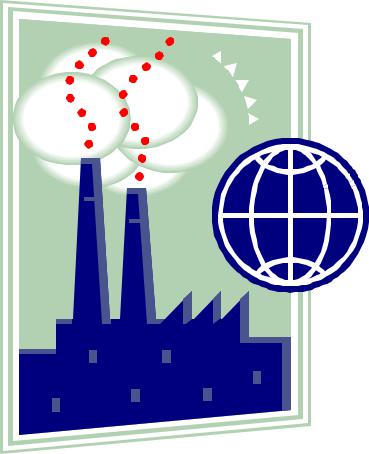
Т.Г. Галкина, И.В. Бреус
ME AND MY WORLD: ENVIRONMENT
Учебно-методическое пособие
Модуль 8
Министерство образования и науки Российской Федерации
Федеральное государственное бюджетное образовательное учреждение высшего профессионального образования
«Сибирская государственная автомобильно-дорожная академия (СибАДИ)»
Т.Г. Галкина, И.В. Бреус
ME AND MY WORLD: ENVIRONMENT
Учебно-методическое пособие
Модуль 8
Омск
СибАДИ
2011
УДК 44
ББК 81.432.1
М 45
Рецензенты:
доктор филологических наук, профессор Л.О. Бутакова
(ФГБОУ ВПО «Омский государственный университет им. Ф.М. Достоевского»);
кандидат филологических наук, доцент И.Н. Ефименко
(ФГБОУ ВПО «Сибирская государственная автомобильно-дорожная академия (СибАДИ)»)
Работа одобрена редакционно-издательским советом академии в качестве учебно-методического пособия для студентов 1, 2 курсов всех спе-циальностей.
Галкина Т.Г., Бреус И.В.
М 45 Me and My World: Environment. Модуль 8: учебно-методическое пособие. Омск: СибАДИ, 2011. – 32 с.
Учебно-методическое пособие «Me and My World» направлено на обучение навыкам устной и письменной речи. Задания, предлагаемые в пособии, построены таким образом, чтобы активизировать мыслительную деятельность обучаемых, оптимизировать учебный процесс за счет экономии времени, усилий педагога и правильной организации самостоятельной работы студентов. Учебно-методическое пособие предназначено для студентов 1, 2
курсов высших учебных заведений.
Ил. 18 . Библиогр.: 17 назв.
ФГБОУ ВПО «СибАДИ», 2011
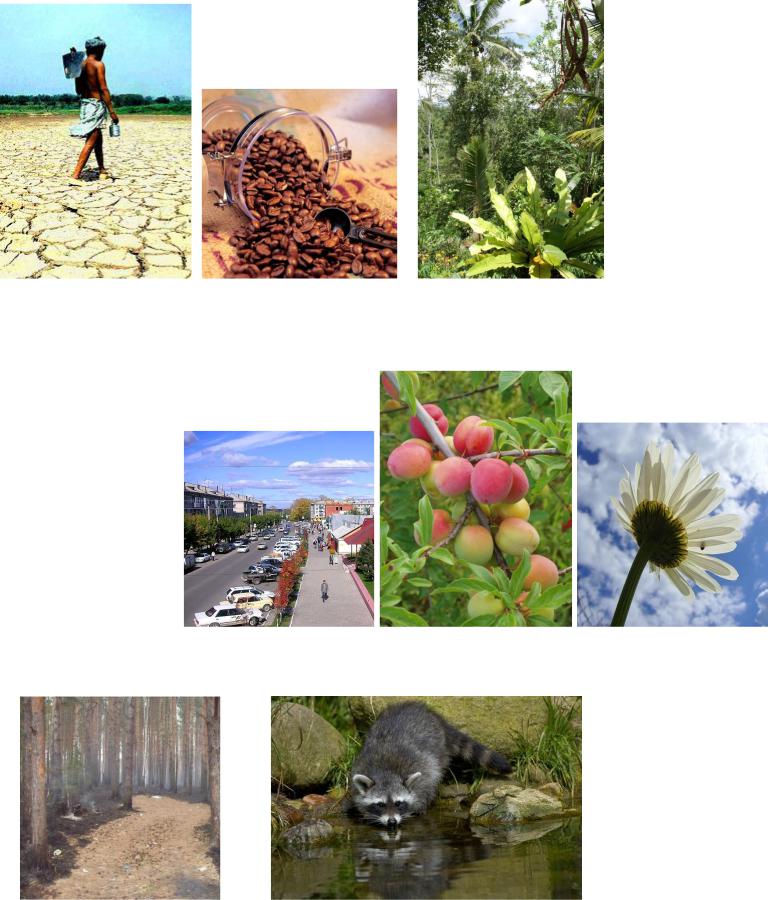
ENVIRONMENT
1. Look at the list of words. What do you think we are going to talk about? animals rivers earth blue skies sea cities rainforests
2.Put these words into the gaps. Then read the poem. What is it about?
Only when all the …… have run dry And all the fish in the …… have died
Only when all the …… have been burnt down And there is no food for the ……
Only when all the …… have been filled with smoke And the …… of the world have choked
Will the white man understand That’s too late to save the …….
3.Choose three pictures which best match the poem and describe them.
Pic. 1 |
Pic. 2 |
Pic. 3 |
Pic. 4 |
Pic. 5 |
Pic. 6 |
Pic. 7 |
Pic. 8 |
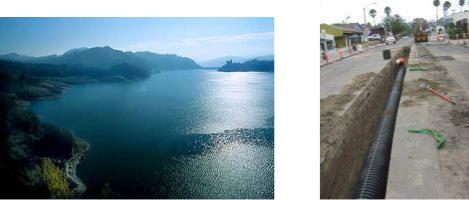
Pic. 9 |
Pic. 10 |
4.What are the main treats facing our environment? Brainstorm ideas! Compare your list with the list in Ex. 7. How can they be avoided?
5.Match these words with their definitions.
Pollution waste protect recycled damage factory emission environmentalist
1)injury or harm;
2)a substance, fluid, etc., that is emitted;
3)to defend from trouble, harm, attack, etc;
4)a building or group of buildings containing a plant assembly for the manufacture of goods;
5)a person who is concerned with the maintenance of ecological balance and the conservation of the environment;
6)to reclaim (packaging or products with a limited useful life) for further use;
7)garbage, rubbish or trash;
8)harmful or poisonous substances introduced into an environment.
6. Use these words to complete the sentences:
1.During the last hundred years we have done great ………to the environment.
2.There’s a large chemical ………in our town which polluted the river twice in the last year.
3.The Government is very worried about the ………of our rivers and beaches.
4.A lot of household ………like bottles and newspapers can be ………and used again.
5.………are furious with the American Government for delaying measures which will reduce greenhouse gas
………
6.There lots of things we can all do to ………the environment.
7.List of problems
Water pollution
Air pollution
Litter
Destruction of the rainforests
Drought
Ozone layer destruction
Radiation
Acid rains
Global warming
8.What causes the damage? Brainstorm ideas!
9.Match the beginnings of the sentences with their endings. Highlight the things that damage the environment.
1.The Government is introducing strict new rules …
2.Farmers contribute to environmental damage …
3.Emissions from factories in northern Germany …
4.Tropical rainforests have always helped to keep the environment in balance …
5.Exhaust fumes from cars and other vehicles cause …
a)but recent deforestation means they no longer absorb as much carbon dioxide as they used to.
b)by spraying crops with pesticides.
c)affect the environment in large parts of Scandinavia.
d)on the dumping of toxic waste by industry.
e)a great deal of damage to the environment.
10. Use the words and phrases from Ex. 5 – 9 to describe your city.
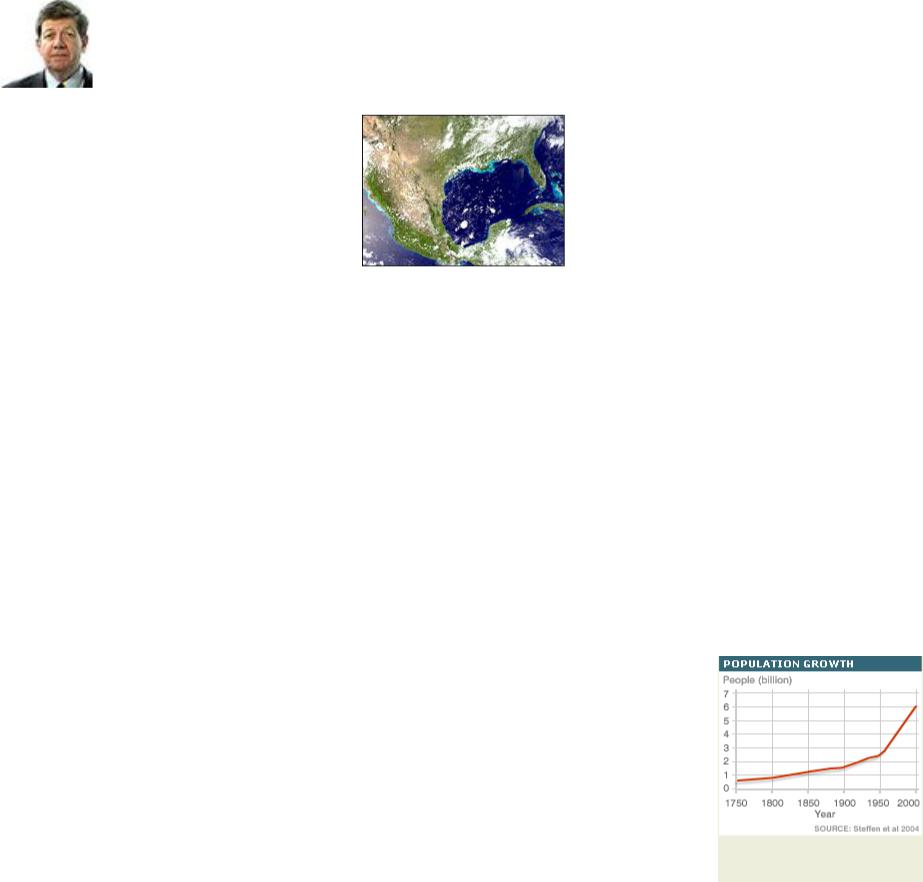
11. Match a word on the left with a word on the right to make common expressions:
global |
rain |
greenhouse |
warming |
ozone |
effect |
acid |
layer |
12. Now use the phrases in the following sentences:
1.The gradual rise in the earth temperature is known as ………
2.When heat gets trapped in the earth atmosphere, it is known as the ………
3.Scientists have found holes in the ………, particularly over Antarctica.
4.Rain mixed with toxic chemicals from factories is known as ………
13.Look at the pictures in Ex. 14 – 15. What do they make you think of?
14.Read the title of the text. What do you think it is about? Write two questions you expect to be answered in the text. Read the text and check if you could find the answers to your questions.
Introduction: Planet Under Pressure
Planet Under Pressure is a six-part BBC News Online series looking at some of the most pressing environmental issues facing the human race today.
Read the first part of the article and say what the human pressure on the Planet is.
By Alex Kirby
BBC News Online environment correspondent
We are a successful breed. Our advance from |
our hominid origins has brought us near- |
||
dominance of the world, and a rapidly |
accelerating understanding of it. |
||
Scientists now say we are in a new stage of the |
Earth's history, the Anthropocene Epoch, |
||
when we ourselves have become the globe's |
principal force. |
Pic. 11 |
|
But |
several eminent scientists are concerned |
that we have become too successful - that |
|
the |
unprecedented human pressure on the |
Earth's ecosystems threatens our future as |
|
a species.
We confront problems more intractable than any previous generation, some of them at the moment apparently insoluble.
15. Read the second part of the article and match the problems with the paragraphs that describe them.
a.Energy.
b.Biodiversity.
c.Human population.
d.Pollution.
e.Climate change.
f.Food.
g.Water.
Pic. 12. From population to cars to forests - graphs
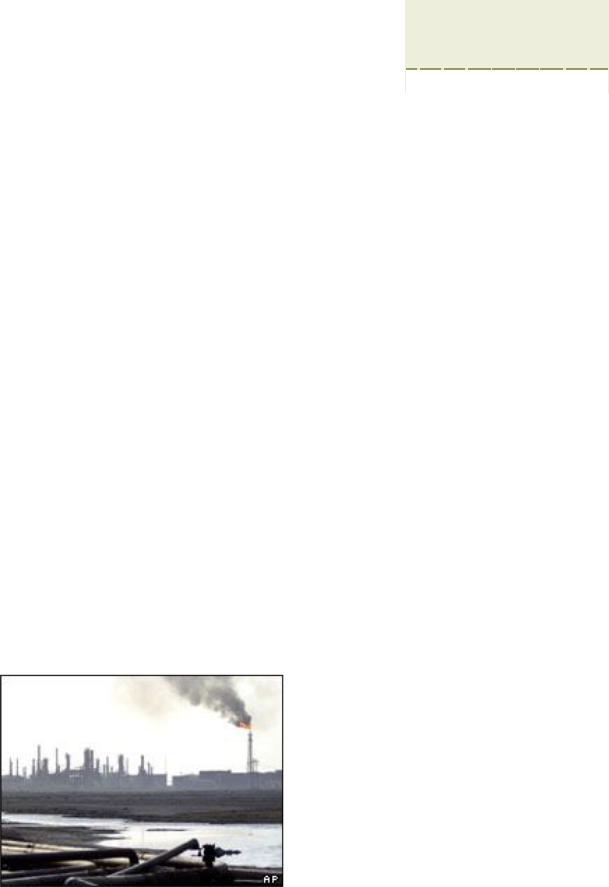
BBC News Online's Planet under Pressure series takes a detailed look at six areas of the increasing |
|
where most experts agree that a crisis is brewing: |
pressures on our planet |
An estimated 1 in 6 people suffer from hunger and malnutrition while attempts to grow  food are damaging swathes of productive land.
food are damaging swathes of productive land.
By 2025, two-thirds of the world's people are likely to be living in areas of acute water stress.
Oil production could peak and supplies start to decline by 2010.
The world's greatest environmental challenge, according to the UK prime minister Tony Blair, with increased storms, floods, drought and species losses predicted.
Many scientists think the Earth is now entering its sixth great extinction phase.
Hazardous chemicals are now found in the bodies of all new-born babies, and an estimated one in four people worldwide are exposed to unhealthy concentrations of air pollutants.
All six problems are linked and urgent, so a list of priorities is little help.
It is pointless to preserve species and habitats, for example, if climate change will destroy them anyway, or to develop novel crops if the water they need is not there.
And underlying all these pressures is a seventh –
There are already more than six billion of us, and on present trends the UN says we shall probably number about 8.9 billion by 2050.
Population growth means something else, too: although the proportion of people living in poverty is continuing to fall, the absolute number goes on rising, because fecundity outstrips our efforts to improve their lives.
Poverty matters because it leaves many people no choice but to exploit the environment, and it fuels frustration. Above all, it condemns them to stunted lives and early deaths - both avoidable.
http://news.bbc.co.uk/2/hi/science/
Pic. 13
16. Find and underline the words in the first part of the article that mean:
1)a person who studies or practises any of the sciences or who uses scientific methods.
2)a system involving the interactions between a community of living organisms in a particular area and its nonliving environment.
3)all the people of approximately the same age, especially when considered as sharing certain attitudes, etc.
17.Write these words in your language.
18.Look at the words from the second part of the article and try to explain them and then write the words in your language.
1)suffer;
2)hunger;
3)malnutrition;
4)productive land;
5)water stress;
6)supplies;
7)avoidable;
8)species losses;
9)extinction phase;
10)hazardous chemicals;
11)unhealthy concentrations;
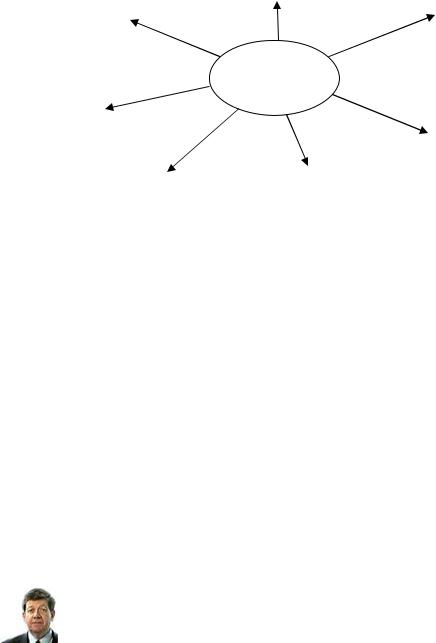
12)urgent;
13)climate change;
14)population growth;
15)poverty;
16)to exploit the environment;
17)environmental challenge.
19.Choose any five words and make sentences to describe environmental problems in your country.
20.Read the article in Ex. 14 – 15 again. Are these statements true or false? Prove your ideas.
1.Some scientists think that we are coming back to Renaissance.
2.Some scientists think that humans are pressed by ecosystem so they can disappear as species in the nearest future.
3.No one in the world starves.
4.Some people like to live in water stress areas.
5.Tony Blair predicted great disasters.
6.In the USA new-born babies are fed by chemicals.
7.United Nations says that the population will decrease.
21.Read the article in Ex. 14 – 15 to find out:
1.What is human pressure?
2.Why can it be useless to protect wild animals and to develop new crops?
3.What causes all environmental problems?
4.How many people are there in the in the world?
5.How many of them live in Russia? What are the future prospects?
6.Why is poverty a factor of environmental problems?
22.Use the Internet to find some data on important environmental problems. Design a poster arranging your information in tables/charts. In group choose the best poster.
23.Write the words associated with the word pollution into the bubbles.
pollution
24.What do you think life and death issue is?
25.Look at the pictures in Ex. 27, 32. What do you think the text is about?
26.Before you read try to predict the right answers to the questions 1 – 4.
1.Life on earth exists only because of
a) greenhouse effect; b) warm temperatures; c) fresh water.
2. The main reason of the global warming is
a) burning of oil, coal and gas; b) changes in land use; c) industrial emissions.
3. When CO2 and other pollutant levels increase
a) some wild animals die; b) humans and animals can feel oxygen scarcity; c) average global temperatures rise.
4. The last Ice Age was …… colder than today.
a) more than 20C; b) only 4-5C; c) approximately 10 – 15C.
27. Read the text and choose the best answers to the questions 1 – 4. Pollution: A life and death issue
By Alex Kirby
BBC News website environment correspondent
As part of Planet Under Pressure, a BBC News website series looking at some of the biggest environmental issues facing humanity, Alex Kirby considers the Earth's growing pollution problem.
One of the main themes of Planet Under Pressure is the way many of the Earth's environmental crises reinforce one another.
Pollution is an obvious example - we do not have the option of growing food, or finding enough water, on a squeakyclean planet, but on one increasingly tarnished and trashed by the way we have used it so far.
Cutting waste and clearing up pollution costs money. Yet time and again it is the quest for wealth that generates much of the mess in the first place.
Living in a way that is less damaging to the Earth is not easy, but it is vital, because pollution is pervasive and often life-threatening.
Air: The World Health Organization (WHO) says 3 million people are killed worldwide by outdoor air pollution annually from vehicles and industrial emissions, and 1.6 million indoors through using solid fuel. Most are in poor countries.
Water: Diseases carried in water are responsible for 80% of illnesses and deaths in developing countries, killing a child every eight seconds. Each year 2.1 million people die from diarrhoeal diseases associated with poor water.
Soil: Contaminated land is a problem in industrialised countries, where former factories and power stations can leave waste like heavy metals in the soil. It can also occur in developing countries, sometimes used for dumping pesticides. Agriculture can pollute land with pesticides, nitrate-rich fertilisers and slurry from livestock. And when the contamination reaches rivers it damages life there, and can even create dead zones off the coast, as in the Gulf of Mexico.
28.Find and underline a word in the first part of the article (Ex. 27) that means:
1.Washed so clean that wet strands squeak when rubbed, completely clean.
2.Easy to see or understand, evident.
3.A large amount of money and valuable material possessions
4.Any transport in or by which people or objects are carried, especially one fitted with wheels.
5.Illness or sickness in general.
29.Write these words in your language.
30.Look at the words from the first part of the article (Ex. 27) and try to explain them, and then write the words in your language.
1) environmental crises;
2) increasingly tarnished;
3) clearing up pollution;
4) less damaging;
5) life-threatening;
6) outdoor air;
7) indoors;
8) industrial emissions;
9) dead zones;
10) contaminated land.
31.Choose any five words and make sentences to describe Picture 13.
32.Read the second part of the article and match the headings with the paragraphs.
a. Trade-off b. For one and all c. Chronic problem 1.
Chemicals are a frequent pollutant. When we think of chemical contamination it is often images of events like Bhopal
(1) that come to mind.
But the problem is widespread. One study says 7-20% of cancers are attributable to poor air and pollution in homes and workplaces.
The WHO, concerned about chemicals that persist and build up in the body, especially in the young, says we may "be conducting a large-scale experiment with children's health".
Some man-made chemicals, endocrine disruptors (2) like phthalates (3) and nonylphenol (4) - a breakdown product
(5) of spermicides, cosmetics and detergents - are blamed for causing changes in the genitals of some animals. Affected species include polar bears - so not even the Arctic is immune. And the chemicals climb the food chain, from fish to mammals - and to us.
About 70,000 chemicals are on the market, with around 1,500 new ones appearing annually. At least 30,000 are thought never to have been comprehensively tested for their possible risks to people.
2.
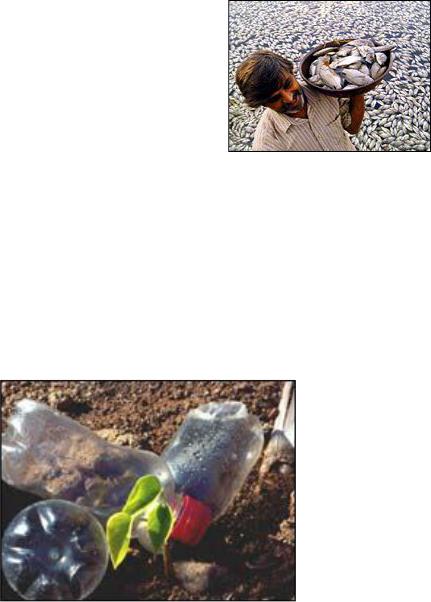
But the snag is that modern society demands survival.
So while we invoke the precautionary on the side of caution, we have to recognise
many of them, and some are essential for
principle, which always recommends erring there will be trade-offs to be made.
Pic. 14
Kankaria Lake in Ahmadabad, India
The pesticide DDT does great damage to wildlife and can affect the human nervous system, but can also be effective against malaria. Where does the priority lie?
The industrialised world has not yet cleaned up the mess it created, but it is reaping the benefits of the pollution it has caused. It can hardly tell the developing countries that they have no right to follow suit.
Another complication in tackling pollution is that it does not respect political frontiers. There is a UN convention on transboundary air pollution, but that cannot cover every problem that can arise between neighbours, or between states which do not share a border.
Perhaps the best example is climate change - the countries of the world share one atmosphere, and what one does can affect everyone.
3.
Pic. 15
One of the principles that is supposed to apply here is simple - the polluter pays.
Sometimes it is obvious who is to blame and who must pay the price. But it is not always straightforward to work out just who is the polluter, or whether the rest of us would be happy to pay the price of stopping the pollution.
One way of cleaning up after ourselves would be to throw less away, designing products to be recycled or even just to last longer.
Previous generations worked on the assumption that discarding our waste was a proper way to be rid of it, so we used to dump nuclear materials and other potential hazards at sea, confident they would be dispersed in the depths.
We now think that is too risky because, as one author wrote, "there's no such place as 'away' - and there's no such person as the 'other'".
Ask not for whom the bell tolls (6) - it tolls for thee (7), and for me.
1.Bhopal is a city in central India, the capital of Madhya Pradesh state and of the former state of Bhopal: site of a poisonous gas leak from a US-owned factory, which killed over 7000 people in 1984 and was implicated in a further
15000 deaths afterwards.
2.Endocrine disruptors – вещества, нарушающие деятельность желез внутренней секреции.
3.Phthalate – фталат (соль или эфир фталевой кислоты).
4.Nonylphenol – нонилфенол.
5.Breakdown product – продукт распада.
6.The bell tolls for smb. (smth.) – пришёл конец кому-л. (чему-л.).
7.Thee – уст. косвенный падеж от thou – тебе, тебя, тобой
33. Are these statements true or false? Prove your ideas.
1.Environmental problems don’t have any influence on each other.
2.Majority of environmental problems can’t do any harm to people and animals.
3.The poorer the country, the more people die from air pollution.
4.Water can’t kill a child.
5.Polluted soil is a great problem only in industrialised countries.
6.The Gulf of Mexico has the purest water in the world.
7.Cancer is a genetic disease.
8.All chemicals in food are carefully tested: they are not harmful to people.
9.Humans can live easily without any chemicals.
10.Every country in the world is responsible for clear environment to the neighbouring countries.
11.The only way to clear up the planet is to burn our waste.
